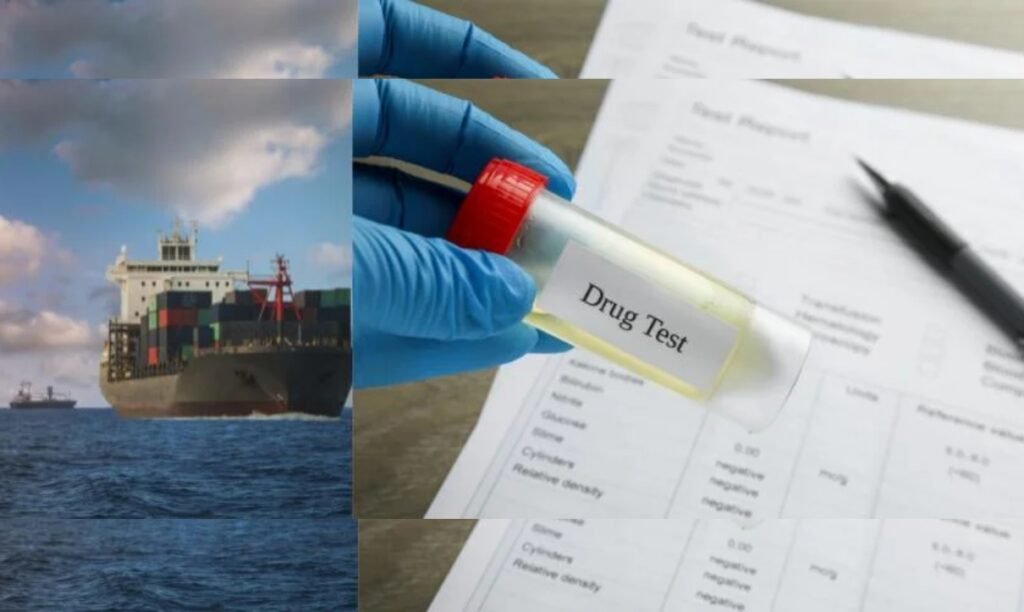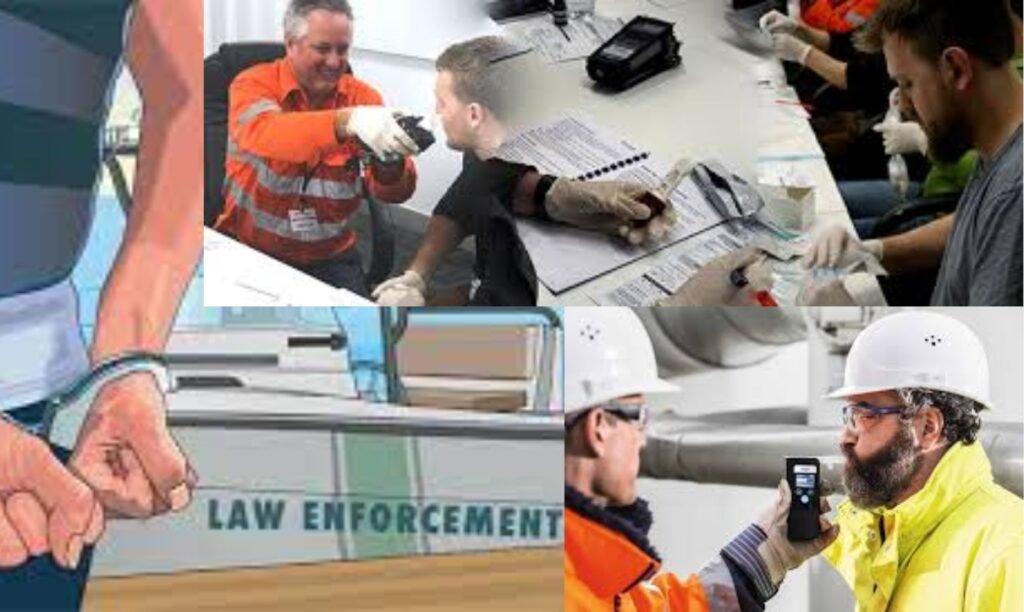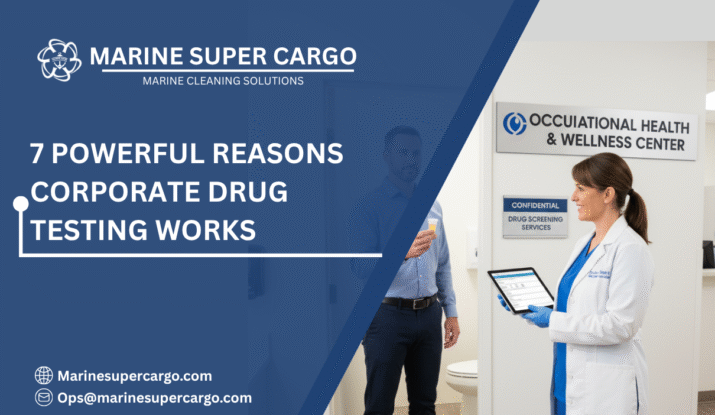Random Drug Testing in Corporate: Why It Works
When you think of workplace safety and performance, Corporate Drug Testing may not be the first topic that comes to mind. Yet, it acts as the invisible guardrail that keeps businesses moving steadily and safely. Just as a ship depends on a clean hull for peak efficiency, a company thrives when its employees function without impairment. Random testing isn’t designed to create suspicion—it’s a safeguard to protect lives, reduce risks, and ensure compliance. In today’s high-stakes industries, both on land and at sea, random drug testing has become a cornerstone of responsible corporate governance.
The Core Purpose of Corporate Drug Testing
Drug testing in the workplace often carries a stigma—it may feel like mistrust. In reality, Corporate Drug Testing exists to verify fitness for duty, much like a vessel inspection ensures seaworthiness. Think about operating complex machinery, managing finances, or navigating cargo; impairment in any of these areas could have devastating consequences. This practice reassures clients and regulators that employees are capable of handling responsibilities safely. For maritime industries, testing aligns with the IMO and the MARPOL Convention, guaranteeing both human safety and environmental protection.

Random vs. Scheduled Testing
Different organizations choose different testing approaches, but not all deliver the same impact. Scheduled tests provide advance notice, giving employees time to prepare or manipulate results. Random testing, however, adds unpredictability. It acts like a silent alarm—employees never know when a test might take place, which discourages substance misuse altogether.
- Scheduled Testing: Predictable, less effective as a deterrent.
- Random Testing: Fair, impartial, and truly preventative.
This unpredictability transforms policies from check-the-box exercises into powerful safety mechanisms that employees take seriously.
Creating a Culture of Safety
Policies alone don’t build safety; behavior does. Adopting Corporate Drug Testing signals that safety is non-negotiable. Employees gradually internalize the message that their choices affect the health and security of the whole team. In high-risk arenas like ports, logistics hubs, or shipping vessels, random testing works like an invisible safety net. It identifies risks before they spiral into accidents. Over time, it fosters a culture where discipline and awareness thrive, which benefits both morale and operational efficiency.
Global Compliance and Industry Standards
To operate responsibly, corporations must align with international frameworks. Random testing upholds compliance with organizations like IMCA, the IMO, and the MARPOL Convention. These rules are not just bureaucratic—they’re safeguards for workers and the environment. In sectors such as aviation, logistics, and maritime, Corporate Drug Testing is becoming a necessity, not an option. A single failed audit can harm licenses, insurance eligibility, and even a company’s future. Testing provides certainty that businesses remain aligned with global expectations. Read also about the Importance of Drug Testing at Work
Reducing Hidden Operational Costs
Neglecting workplace safety often leads to costs hidden beneath the surface. Substance misuse leads to accidents, poor decision-making, absenteeism, and ultimately, financial losses. Think of it like barnacles on a vessel’s hull: small, but capable of dragging performance down significantly. By introducing Corporate Drug Testing, organizations see reductions in:
- Accident-related expenses
- Absenteeism and lost efficiency
- Rising insurance claims
- Reputational damage and compliance risks
Prevention is always cheaper than recovery, making drug testing a wise financial strategy. learn more about Employee Alcohol Testing.
Supporting Employees Beyond Testing
At its core, Corporate Drug Testing isn’t about punishment—it’s about welfare. Random testing helps identify employees facing personal struggles and connects them to Employee Assistance Programs (EAPs), counseling, or rehabilitation. It’s the workplace equivalent of a medical check-up, catching early symptoms before they escalate. In this way, testing safeguards the workforce without alienating individuals, strengthening employee trust in leadership. When workers know the company values their health and future, engagement and loyalty increase.
Technology and Modern Testing Methods
Today’s testing methods are remarkably advanced. From oral swabs to hair follicle analysis, Corporate Drug Testing is faster and more accurate than ever before. Companies are even turning to AI-driven software to determine testing schedules fairly and eliminate bias in employee selection. This ensures credibility in the testing process. Looking ahead, technologies may include biometric monitoring tools that provide real-time alerts, offering organizations even stronger protection against human error. These innovations keep the practice modern, fair, and reliable. Read Also about Ensuring safer seas with 0 risks through cargo safety testing
Marine Supercargo Expands Services: Drug & Alcohol Testing for Safer Seas
Marine Supercargo, internationally known for its marine hull cleaning expertise, has expanded into drug & alcohol testing services for shipping companies worldwide. The move is a natural progression for an organization already focused on operational efficiency and compliance. By introducing these services, they address a critical challenge: how to reduce human error at sea through proactive safety measures.
This service helps ship owners, operators, and managers meet requirements from the IMO and the IMCA while also reducing reputation and compliance risks. A crew member operating under the influence can jeopardize an entire voyage, endanger marine ecosystems, and expose companies to massive liabilities. By combining hull cleaning efficiency with human reliability through testing, Marine Supercargo now provides holistic operational support. This integration ensures safe, compliant, and cost-effective voyages—a powerful advantage for operators managing complex fleets.
✅ 4 Things to Check for Safety at Sea pic.twitter.com/dAxhJQ2i6U
— Marine Super Cargo (@Marinsupercargo) September 14, 2025
Driving Productivity and Performance
Workplace impairment impacts productivity as much as it affects safety. Delays occur, team morale dips, and efficiency wanes. By implementing Corporate Drug Testing, corporations ensure their teams function at peak mental and physical capacity. Much like lubricating machinery reduces friction, testing clears away inefficiencies that slow operations. Employees approach work with a greater sense of accountability, which naturally translates to higher productivity and a stronger corporate reputation.

The Future of Corporate Drug Testing
The role of Corporate Drug Testing will only expand as technology, society, and regulatory frameworks evolve. The future likely includes integrated safety models, where testing combines with wellness programs and digital tools to provide holistic solutions. Companies will not just detect problems—they’ll prevent and manage them within broader mental health initiatives. Just as regular hull cleaning guarantees maritime efficiency, regular testing will become a cornerstone of effective workforce management.
Conclusion
Random drug testing is more than a compliance requirement—it’s the lifeline that ensures workplace safety, financial protection, and operational continuity. First, it creates a safety culture where responsibility is clear. Second, it prevents costly mistakes that drain organizational resources. Third, it prepares companies to meet global compliance rules without compromise. For corporates, investing in proactive safety pays long-term dividends. To achieve sustainable, compliant, and safe operations, explore practical insights at CleanShip.co.
FAQs:
Q1. Why is Corporate Drug Testing essential?
It safeguards employees, prevents accidents, and ensures companies meet safety and compliance regulations in high-risk industries.
Q2. How does random testing outperform scheduled testing?
Random drug testing removes predictability, ensuring employees cannot prepare ahead of time, making it a more effective deterrent.
Q3. How does testing help with compliance?
Q4. Why connect drug testing with marine hull cleaning?
Both preserve efficiency—clean hulls make vessels faster, while drug testing keeps humans reliable. Together, they safeguard cost efficiency and safety.
Q5. What trends lie ahead in workplace testing?
Expect AI-driven selection methods, integration with wellness programs, and real-time biometric monitoring for even stronger future safeguards.


